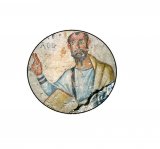El misterio de la piedad.
Y, por confesión unánime, grande es el misterio de la piedad:
Él fue manifestado en carne,
Fue justificado en Espíritu,
Fue visto por los ángeles,
Fue proclamado entre los gentiles,
Fue creído en el mundo,
Fue recibido arriba en gloria.
(Versión original)
Faneróthike sti sárka
Dikaióthike en Pnévmati
To eídan oi ángeloi
Anakirýchthike metaxý ton Ethnón
To pístevan ston kósmo
Analífthike me dóxa.
About this poem
La poesía, que se estima fue escrita alrededor del año 61 d. C., es muy reconocida, trata sobre el gran e indiscutible misterio de la piedad en el mundo. Fue escrita originalmente en GRIEGO.
Font size:
Written on June 12, 2021
Submitted by manuel.81789 on December 05, 2021
Modified on March 05, 2023
- 21 sec read
- 10 Views
Quick analysis:
| Scheme | ABACCADEFAEGHC |
|---|---|
| Closest metre | Iambic tetrameter |
| Characters | 426 |
| Words | 70 |
| Stanzas | 1 |
| Stanza Lengths | 14 |
Translation
Find a translation for this poem in other languages:
Select another language:
- - Select -
- 简体中文 (Chinese - Simplified)
- 繁體中文 (Chinese - Traditional)
- Español (Spanish)
- Esperanto (Esperanto)
- 日本語 (Japanese)
- Português (Portuguese)
- Deutsch (German)
- العربية (Arabic)
- Français (French)
- Русский (Russian)
- ಕನ್ನಡ (Kannada)
- 한국어 (Korean)
- עברית (Hebrew)
- Gaeilge (Irish)
- Українська (Ukrainian)
- اردو (Urdu)
- Magyar (Hungarian)
- मानक हिन्दी (Hindi)
- Indonesia (Indonesian)
- Italiano (Italian)
- தமிழ் (Tamil)
- Türkçe (Turkish)
- తెలుగు (Telugu)
- ภาษาไทย (Thai)
- Tiếng Việt (Vietnamese)
- Čeština (Czech)
- Polski (Polish)
- Bahasa Indonesia (Indonesian)
- Românește (Romanian)
- Nederlands (Dutch)
- Ελληνικά (Greek)
- Latinum (Latin)
- Svenska (Swedish)
- Dansk (Danish)
- Suomi (Finnish)
- فارسی (Persian)
- ייִדיש (Yiddish)
- հայերեն (Armenian)
- Norsk (Norwegian)
- English (English)
Citation
Use the citation below to add this poem to your bibliography:
Style:MLAChicagoAPA
"El misterio de la piedad." Poetry.com. STANDS4 LLC, 2025. Web. 6 Mar. 2025. <https://www.poetry.com/poem/115185/el-misterio-de-la-piedad.>.






Discuss the poem El misterio de la piedad. with the community...
Report Comment
We're doing our best to make sure our content is useful, accurate and safe.
If by any chance you spot an inappropriate comment while navigating through our website please use this form to let us know, and we'll take care of it shortly.
Attachment
You need to be logged in to favorite.
Log In